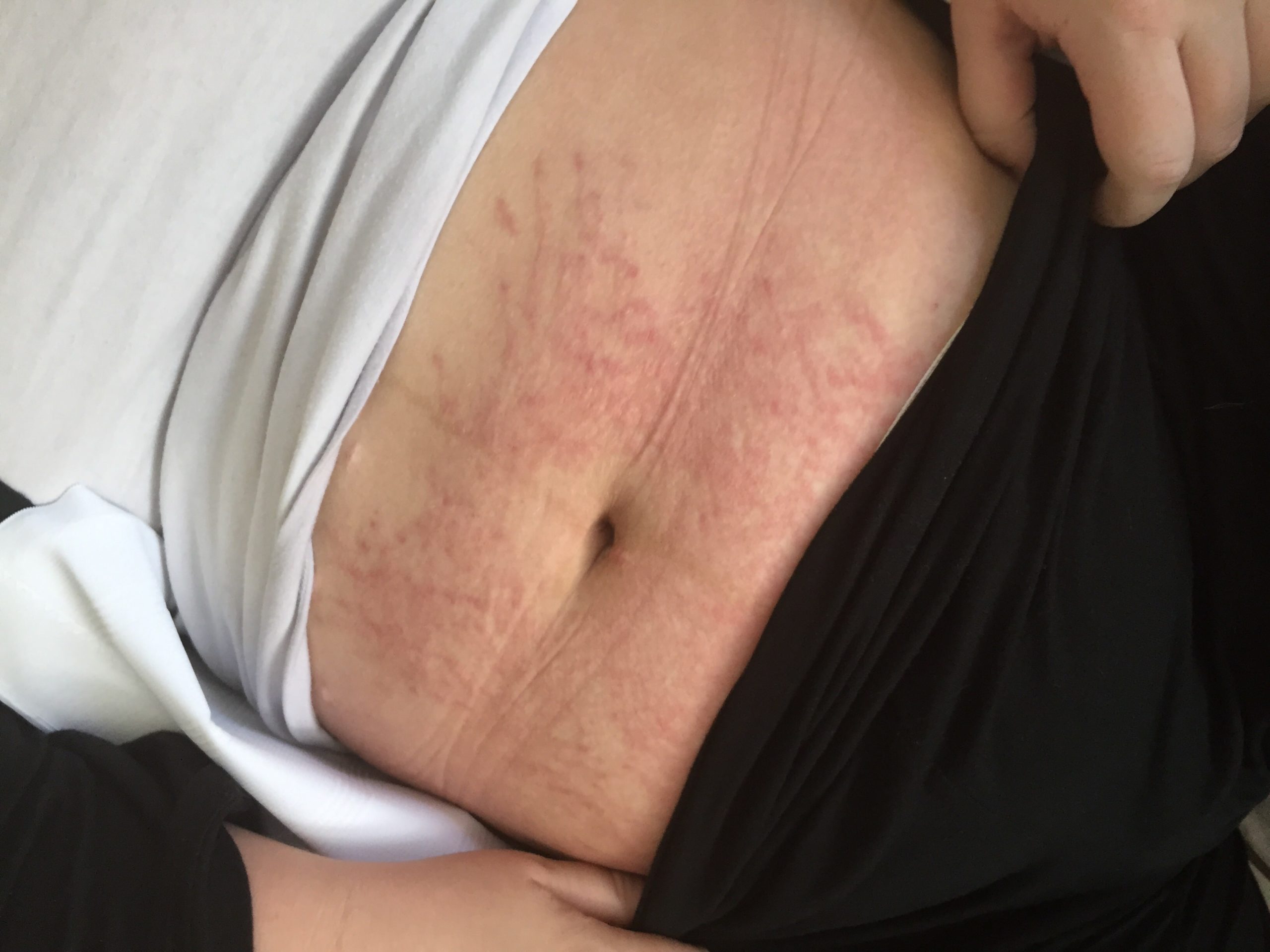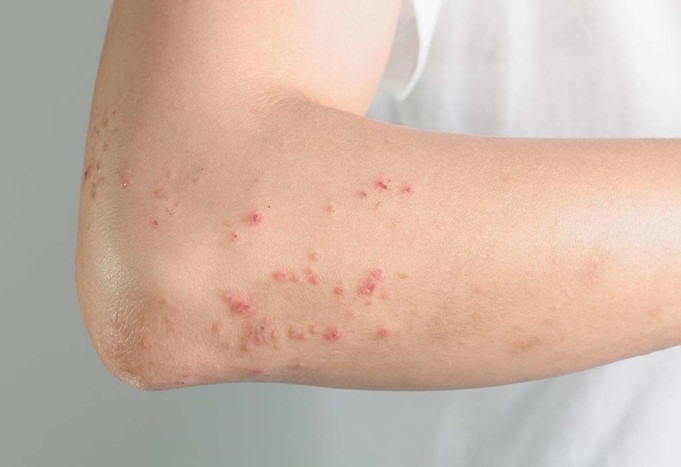Postpartum hives are common problems many women encounter after childbirth. Some women come down with Postpartum hives after delivery, and the reasons may vary from one individual to the another.
Postpartum hives are characterized by raised, itchy rashes that are red in colour or skin-coloured. The body is naturally designed to suppress its immune system during pregnancy.
This way, the body does not attack or reject the growing foetus. This is why the body can effectively and sufficiently fight off allergens and other things that can cause inflammation to the body, such as one’s environment or food.
Due to the suppressed immune system of the pregnant individual, postpartum hives occur as a result of the body’s reaction to allergens. The body releases a certain kind of protein called Histamine and other chemicals into the bloodstream.
This Histamine causes the tiny blood vessels to become bloated, allowing the plasma to leak into the skin. When the fluid accumulates in the skin, inflammation and the itchy rash occurs on the surface of the affected area.
Postpartum hives are not contagious unless they contain viruses that can be transmitted from one person to the other. Postpartum hives are also known as welts, weals, nettle rash, urticaria.
They are mostly found to occur on the feet, arms and back.
Causes
Postpartum hives are known to be caused by a high level of stress that comes with having a new baby, hormonal changes and can also be triggered by allergies. Although sometimes, the causes remain unknown.
Other factors may trigger the onset of Postpartum hives such as;
- An underlying disorder like a hyperactive or hypoactive thyroid gland, diabetes, rheumatoid arthritis
- Seasonal allergies
- Insect bites or stings
- Being exposed to extreme weather conditions such as a direct sun/heat exposure or extremely cold conditions
- Food sensitivities
- Medications such as aspirin or penicillin
However, allergies and food sensitivities are strong triggers of Hives even though one has given birth or not.
Symptoms

Symptoms of Postpartum Hive includes the following;
- Red or skin-coloured swelling on the surface of the skin
- Raised welts or plaques on the affected area
- The affected area may become white or pale
- Itching (this could be mild to severe)
- Burning sensation
- Pain on the skin area where the bumps are visible
- The skin may become scaly
Hives that occur over the months and years are known as Episodic Hives, Flare-up Hives or Chronic Hives, and it is strongly advised to contact your health care provider. You are also recommended to consult a dermatologist to rule out other underlying conditions like other infections.
Certain food sensitivities and allergies trigger allergic reaction regardless of whether they have given birth or not. Other complications may arise from Postpartum Hives, and they include;
- Anaphylaxis: This is a severe allergic reaction that causes breathing difficulty
- Swelling of the throat: This may block the airways.
Treatment
Usually, Postpartum Hives lasts for five to six weeks, but they are self-resolving and may not require any treatment. However, in cases where they do not get better after six weeks, or they become episodic or tend to be reoccurring every few months, then it is advised to seek a doctor’s attention.
You are also recommended to consult a dermatologist to rule out other underlying conditions. There are various remedial measures one can take to relieve the pain, discomfort, burning and itching that comes with Postpartum Hives and some of them include;
- By getting enough rest and sleep to help control anxiety and stress. Managing one’s stress level has shown to be effective in the prevention and treatment of Postpartum Hives. Recent research indicates that stress is a significant trigger of the Postpartum Hive.
- It is best to wear cotton made clothing or light ones to allow your skin breath. Loose-fitting clothing can be worn too.
- Use or apply quality sunscreen lotion if you are going to be out under the sun.
- Always hydrate as water is essential, especially for the skin. Water flushes out toxins, maintains moisture and keeps the skin healthy.
- Use a good moisturizer preferably fragrance-free several times a day to prevent dry skin.
- Get an ice pack and rub it on the itchy part of your skin a few times daily. This ice pack is made when you wrap some ice cubes in a cloth. This helps provide relief but if the cold temperatures are a trigger for your hives, then avoid doing this.
- You can consult your doctor to prescribe topical creams or ointments that can soothe the welts. They relieve the pain and burning sensations.
There are other home remedies one can adopt to help alleviate symptoms; These home remedies include;
- Oatmeal: Oatmeal is known for its anti-irritating, anti-inflammatory and skin-soothing properties. It is known to provide rapid relief from itching and swelling that is associated with The Postpartum Hive.
- Apple cider vinegar: Apple cider vinegar contains anti-histamine properties that offer relief from inflammation that comes with Postpartum Hive. Apple cider vinegar also helps regulate the body immune system reaction. It is an excellent remedy that is known to be effective.
- Chamomile: Chamomile is another fantastic and safe remedy. This herb is known to contain anti-histamine and anti-inflammatory properties. It helps reduce the itching, swelling and inflammation.
- Calamine Lotion: This can be used to treat the welts and the raised skin due to Postpartum Hives. It is quite effective, and it hastens the healing process.
- Aloe Vera: Aloe Vera is one of the plants known to be effective in the treatment of Postpartum Hives. It contains anti-inflammatory, moisturizing and soothing properties.
- Turmeric Milk: Turmeric is a spice that boosts the body’s resistance and wellness quotient. It causes the body to produce anti-inflammatory corticosteroids. It also possesses antioxidant and anti-histamine properties. When you mix a teaspoon of turmeric with a glass of milk, the mixture should provide relief from the symptoms of Postpartum Hive.
While undergoing treatments, there are also other measures one needs to adapt to hasten the healing process.
- Avoid sugar, alcohol or any sweets as this will make the itching worse although one can have honey.
- Your diet should be light and digestible to give your digestive system great flushing.
- Eat food that has skin-soothing properties such as split beans, pomegranate, bitter gourd.
- Avoid using processed oil for cooking. Use Olive oil instead.
- Avoid using products such as soap or body cream or lotion on the body.
- Avoid causative food such as salty and pungent food, excessive consumption of mustard.
- Avoid contact with cold substances if they have shown to be a trigger The Postpartum Hive.
If symptoms don’t resolve within six weeks, consult a doctor.












